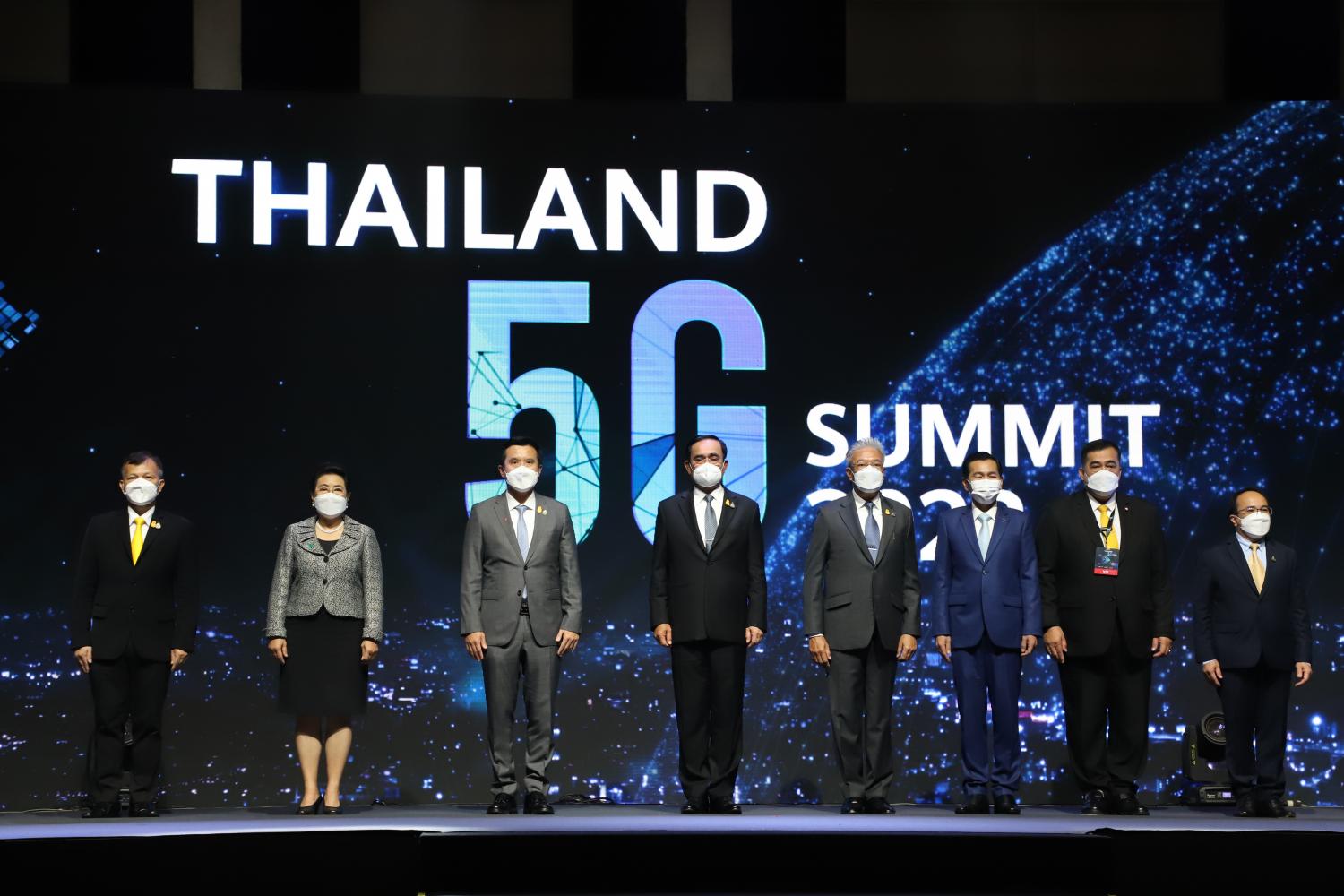
The Digital Economy and Society (DES) Ministry has unveiled a 5G technology alliance aimed at transforming 5G showcases into real use cases with a target of rolling out 10 of them this year.
The alliance was established to build an affiliate network of 5G tech parties, including telecom operators, vendors and corporate users, to drive the 5G ecosystem.
There are 20 current development projects related to 5G use cases under the alliance, which was initiated in April this year.
The alliance was formed through an agreement made by the Telecommunications Association of Thailand, Digital Economy Promotion Agency (Depa) and DES Ministry.
5G ALLIANCE
DES Minister Chaiwut Thanakamanusorn said the alliance includes 260 companies associated with 5G business and services, while more could be added to boost the 5G ecosystem.
Mr Chaiwut was speaking on Thursday on the sidelines of Thailand 5G Summit 2022: "The 5G Leader in the Region", hosted by Depa and supported by Huawei Technologies Thailand and the Global System for Mobile Communications Association (GSMA). The 5G tech showcase, taking place at Centara Grand Hotel and Bangkok Convention Center at CentralWorld, ends today.
The alliance was announced at the event chaired by the prime minister. Participants included representatives from the National Broadcasting and Telecommunications Commission, industrial associations, Advanced Info Service, True Corporation, the Thai IoT Association and Telecommunications Association of Thailand.
According to Mr Chaiwut, the alliance is to promote and drive 5G applications in the industrial sector to increase the country's economic value through service system upgrades for smart agriculture, health tech, manufacturing, tourism, security, education and logistics.
5G use case development should also be a boon for people's quality of life, he said.
"Corporations and enterprises in the alliance will benefit from several incentives, including tax breaks from the Board of Investment," said Mr Chaiwut.
"Innovation plays a pivotal role in increasing digital applications in various sectors. 5G tech is a key infrastructure component for the country's future economic and social transformation."
Corporations in the alliance that provide digital services listed for government procurement would also benefit from the promotion, he said.
The list of digital services for government procurement is defined by Depa and is being considered for approval by the cabinet.
Private enterprises that purchase digital products and services on the list will also be eligible for a 200% corporate income tax deduction, said Mr Chaiwut.
Some 500 products and services have been earmarked for the list this year and 5 billion baht is expected to be added to the country's economy in the first year of the project.
He said internet penetration is at 78% of the country's population, while Thais spend an average of 8 hours and 44 minutes per day on the internet, the ninth highest globally.
There are 120 million registered SIM cards in the Thai market, while the country ranks No.2 for mobile commerce adoption worldwide.
Depa president and chief executive Nuttapon Nimmanphatcharin said Thailand has strong telecom infrastructure nationwide, especially for 5G networks.
Concerning the alliance, Depa has a mission to facilitate matching between corporate users, telecom operators and vendors, as well as help push for 5G use cases, said Mr Nuttapon.
"Commercial 5G will be developed in the market in 3-5 years, driven by automation development, connected access and data support," he said.
MILESTONE FOR THAILAND
GSMA called establishing the 5G alliance a significant milestone for the country.
"This is the first alliance to develop a 5G ecosystem in Southeast Asia. GSMA's APAC 5G Industry Community is pleased to collaborate with Huawei, the leading global ICT company, to drive applications using 5G technology in the Thai industrial sector to their maximum potential," Julian Gorman, head of GSMA for Asia-Pacific, said at the event.
Mr Gorman praised Thailand as a pioneer market in pushing the boundaries and exploring combinations of technologies to solve industry problems, create efficiencies, and invent new business models and approaches.
He said ongoing progress involves many parties working together. Three factors for maximising 5G industry opportunity in GSMA's view are spectrum policy and framework, infrastructure competition, and ecosystem collaboration.
HUAWEI PUSHES AHEAD
Huawei outlined plans to help Thailand capture emerging opportunities and build a better "green digital life" through 5G technology.
Simon Lin, president of Huawei Asia-Pacific, said the 5G rollout is progressing quickly and the pioneers in the region have crossed into a golden age.
He views Thailand as a 5G leader within Asean. As a result, Mr Lin vowed to continuously support Thailand's 5G progress in three key areas: building a leading 5G infrastructure, driving 5G industry applications, and creating a 5G industry and talent ecosystem.
The first area of focus for Huawei is continuing integrated efforts in infrastructure, industry applications and ecosystem.
"5G redefines user experience, and the best user experience brings the best and biggest commercial success for operators," he said.
"Together with Thailand's operators, we will keep providing high-quality 5G content for consumers and help operators succeed. This includes augmented reality services, 8K videos and metaverse games."
At the same time, Huawei will work with operators to provide cable and fibre-free high-speed broadband options, said Mr Lin.
This is expected to help Thailand remove copper wires, maintaining a safe and clean environment, he said.
Second, Huawei plans to dive into Thailand's industry digitalisation scenarios to boost its economy, said Mr Lin.
The firm wants to support the digitalisation of several Thai industries, including five mines, two ports, 50 factories and 20 hospitals in 2022, he said.
As for the third area, Huawei plans to work with customers and partners to create an open 5G ecosystem.
"The first effort involves building an industry ecosystem," said Mr Lin.
"In the past several years, our open lab and 5G EIC [Ecosystem Innovation Centre] have shown great value in driving innovation. 5G EIC has attracted over 100 partners to incubate innovative cases, such as smart ambulances, smart poles and 5G Machine Vision."







